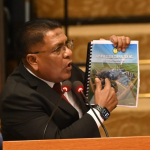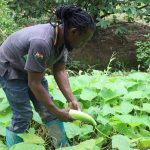Prices for many fresh vegetables and fruits continue to reduce owing to the increasing availability of these commodities on the local market thanks to interventions by the National Agricultural Research and Extension Institute (NAREI) following the 2021 devastating flood.
The flood had created a severe shortage of fruits and vegetables which resulted in a significant hike in prices. The spending power of consumers had reduced, and many were disgruntled. As such, NAREI provided farmers with seedlings and seeds to ensure they go back into operation quickly. In some instances, new crop types were introduced in several communities, as part of NAREI’s crop diversification programme. Of course, Extension Officers were constantly providing technical support farmers.
Hinterland Regions
Approximately, 80% of the farming communities in Regions One, Seven, Eight and Nine benefitted from this initiative. As a result, 742 farmers of which 438 were women received a variety of crops such as bora, hot and sweet peppers, cucumber, cabbage, pakchoy, celery, tomato, ochro.
Coastal Regions
In Region Two, approximately 1,575 packs of seeds and 61 trays of seedlings including boulanger, celery, lettuce, pumpkin, cucumber, pepper, pak-choy, cabbage, tomato, broccoli, parsley, ochro, bora, coconut, lemon, and guava were distributed to 950 farmers. While, affected farmers and kitchen gardeners in Region Three received seeds, as well as, fertilizers, insecticides, fungicides, nematicides, acoushi ant bait.
In Region Four, along the Linden/Soesdyke Highway, 1,600 packets of seed were distributed of which 1,300 packs were donated to farmers in St. Cuthbert’s Mission. This was done during a visit by the Honorable Minister of Agriculture, Zulfikar Mustapha.
Bundles of cassava sticks were distributed in Hauraruni. The sticks were shared to encourage the farmers to expand their production of cassava for cassava bread production. Two hundred and fifty three-year coconut palms were given to farmers in Loo Creek and St. Cuthbert’s Mission.
In Mahaica, about 45 farmers received vegetable seeds such as lettuce, pumpkin, pakchoy, sweet pepper, celery, cucumber. On the Lower East Coast of Demerara, about 275 farmers received 630 packets of similar vegetable seeds were shared among farmers. Seven hundred and fifty packets of seeds were given to 320 farmers from various communities on East Coast of Demerara.
Along the East Bank of Demerara, approximately 600 packets of seeds were distributed in various communities such as Providence, Mocha-Arcadia, Craig, Friendship, Timehri and Soesdyke. During these exercises across Region Four, other inputs such as fertilizer, insecticides, fungicides and acoushi ant bait were donated.
In Region Five, both seeds and seedlings were given to farmers. A total of 115 families benefited. The three main crop types donated were tomato, celery, and sweet pepper. A total of 283 trays (31,130 seedlings) were distributed during this process.
In Region Six, the Benab and Lesbeholden Plant Nurseries of NAREI distributed seeds and seedlings. From September 2021 to March 2022, the two nurseries distributed 650 packets (110 g each) of seeds, 3,013 trays (331,430 seedlings) of vegetable seedlings and 10,909 mixed fruits and coconuts seedlings from Canje Creek to Orealla/Siparuta.
For Region 10, farms located in the Upper Berbice River locations faced most of the devastation as the water remained on the land for a longer period. NAREI embarked on an agri-input distribution programme. Seed distribution conducted in the Region mainly targeted small holder farmers from Kwakwani but farmers from Hururu, Kaitopen (Kaicochen) and Ladernsville also benefited.








